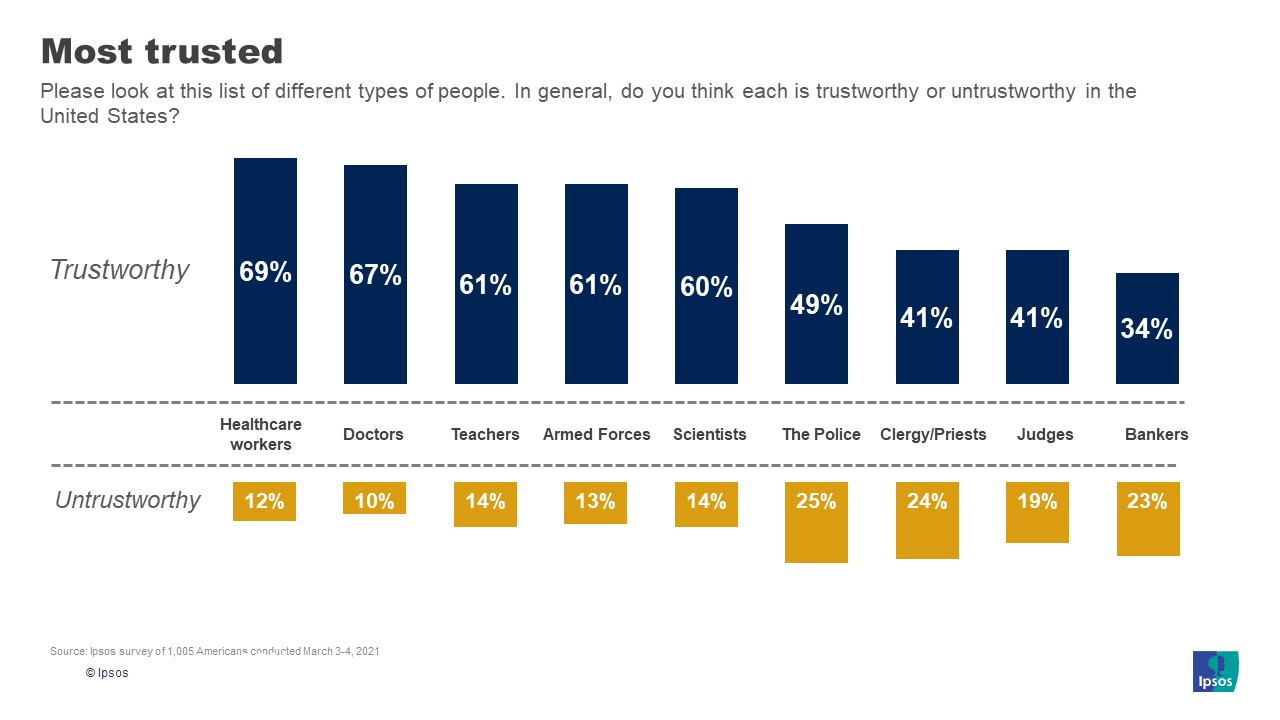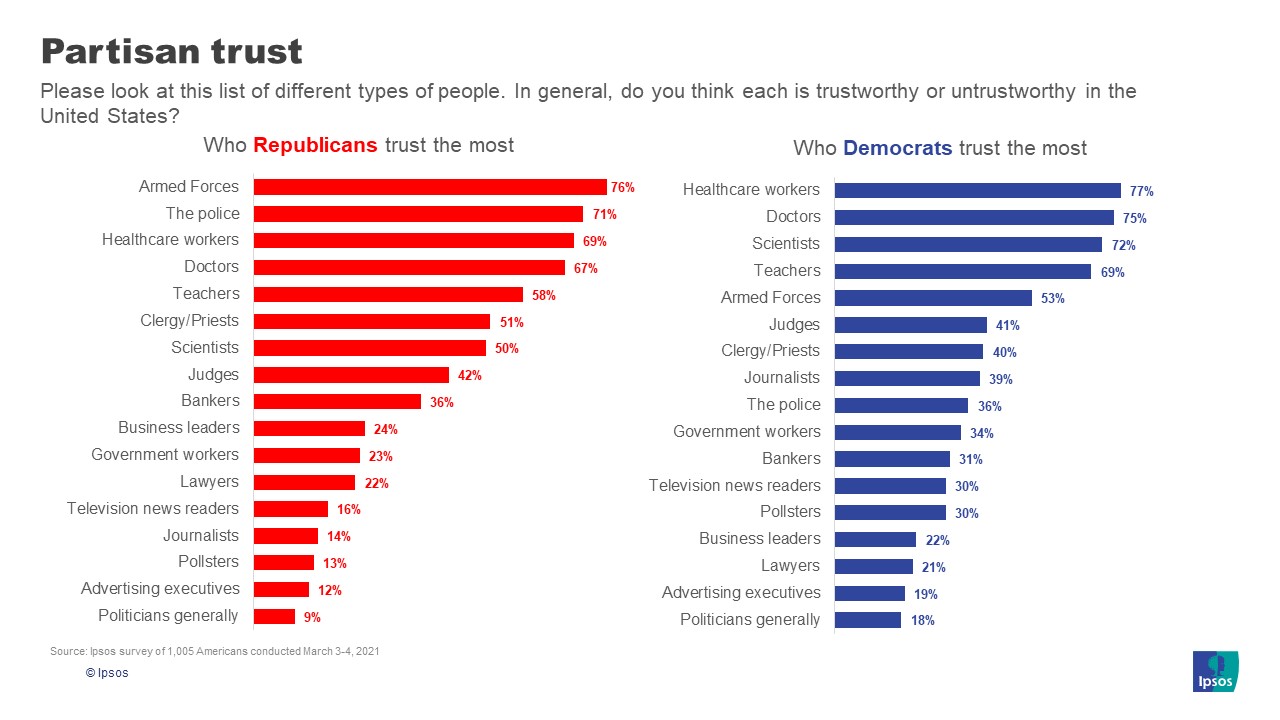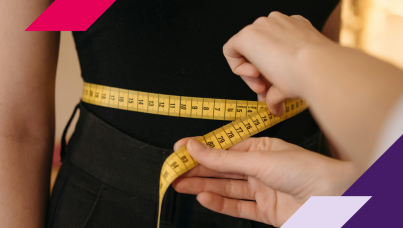Americans are most likely to trust healthcare workers and doctors
Washington, DC, March 12, 2021 — As the country reaches its one-year anniversary of the COVID-19 pandemic, a new Ipsos poll shows that Americans are most likely to trust healthcare workers. On the other hand, deep partisan divides exist when it comes to how Americans view top political figures.
Detailed Findings
1. Americans find those professions within healthcare and academia to be the most trustworthy.
- Healthcare workers are the most likely to be viewed as trustworthy, with 69% of Americans finding saying they find them trustworthy.
- Americans also find doctors (67%) and teachers (61%) to be trustworthy professions. Democrats are especially positive, with 75% finding doctors trustworthy and 69% for teachers.
2. Americans are more skeptical of those that work in government.
- Politicians are the least trusted profession, with only 15% of Americans finding them trustworthy.
- Government workers are also not very reliable according to Americans, with only 27% finding them trustworthy.


3. Partisan divides are evident amongst top political figures
- President Joe Biden (55%) and Vice President Kamala Harris (50%) both have favorability ratings at or above 50%. However, they are heavily favored by Democrats, with 88% finding Biden favorable and 85% for Harris, compared to 19% and 15% respectively amongst Republicans.
- Thirty-six percent of Americans find former President Donald Trump to be favorable, and 39% find former Vice President Mike Pence favorable. Republicans find both Trump (73%) and Pence (69%) much more favorable than Democrats (11% and 24%, respectively).
- Outside of the oval office, more favorable government officials include Michelle Obama (62%), Dr. Anthony Fauci (59%) and Bernie Sanders (50%). Less favorable officials include Congresswoman Alexandria Ocasio-Cortez (35%), Congressman Ted Cruz (30%), Senator Mitch McConnell (21%), and Congresswoman Marjorie Taylor Greene (18%).
4. Americans have favorable views of most entertainers.
- Tom Hanks was the most favorable of those surveyed, with 72% of Americans finding him to be favorable.
- Taylor Swift (56%), Tom Brady (55%), Beyoncé (53%), Lebron James (51%), and Britney Spears (51%) were also amongst the most favorable entertainers.
- Ellen DeGeneres (43%) and Charli D'Amelio (16%) were found to be the most unfavorable entertainers. However, D’Amelio’s low favorability is driven by the fact that 70% of Americans say that they do not know how they view her.
About the Study
These are some of the findings of an Ipsos poll conducted between March 3-4, 2021. For this survey, a sample of 1,005 adults age 18+ from the continental U.S., Alaska, and Hawaii was interviewed online in English. The sample includes 468 Democrats, 356 Republicans, and 98 Independents.
The sample was randomly drawn from Ipsos’ online panel, partner online panel sources, and “river” sampling and does not rely on a population frame in the traditional sense. Ipsos uses fixed sample targets, unique to each study, in drawing a sample. After a sample has been obtained from the Ipsos panel, Ipsos calibrates respondent characteristics to be representative of the U.S. Population using standard procedures such as raking-ratio adjustments. The source of these population targets is U.S. Census 2018 American Community Survey data. The sample drawn for this study reflects fixed sample targets on demographics. Posthoc weights were made to the population characteristics on gender, age, race/ethnicity, region, and education.
Statistical margins of error are not applicable to online non-probability polls. All sample surveys and polls may be subject to other sources of error, including, but not limited to coverage error and measurement error. Where figures do not sum to 100, this is due to the effects of rounding. The precision of Ipsos online polls is measured using a credibility interval. In this case, the poll has a credibility interval of plus or minus 3.5 percentage points for all respondents. Ipsos calculates a design effect (DEFF) for each study based on the variation of the weights, following the formula of Kish (1965). This study had a credibility interval adjusted for design effect of the following (n=1,005, DEFF=1.5, adjusted Confidence Interval=+/-5.0 percentage points).
The poll also has a credibility interval of plus or minus 5.2 percentage points for Democrats, plus or minus 5.9 percentage points for Republicans, and plus or minus 11.3 percentage points for Independents.
For more information on this news release, please contact:
Chris Jackson
Senior Vice President, U.S., Public Affairs
Ipsos
+1 202 420-2025
[email protected]
Kate Silverstein
Media Relations Specialist, U.S., Public Affairs
Ipsos
+1 718 755-8829
[email protected]
About Ipsos
Ipsos is the world’s third largest Insights and Analytics company, present in 90 markets and employing more than 18,000 people.
Our passionately curious research professionals, analysts and scientists have built unique multi-specialist capabilities that provide true understanding and powerful insights into the actions, opinions and motivations of citizens, consumers, patients, customers or employees. We serve more than 5000 clients across the world with 75 business solutions.
Founded in France in 1975, Ipsos is listed on the Euronext Paris since July 1st, 1999. The company is part of the SBF 120 and the Mid-60 index and is eligible for the Deferred Settlement Service (SRD).
ISIN code FR0000073298, Reuters ISOS.PA, Bloomberg IPS:FP www.ipsos.com



